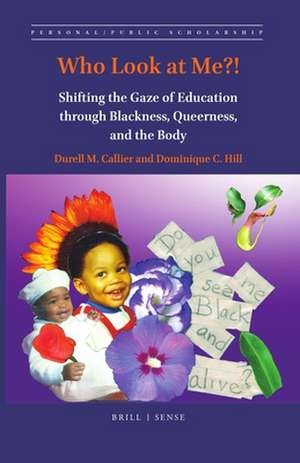Who Look at Me?!: Shifting the Gaze of Education through Blackness, Queerness, and the Body: Personal/Public Scholarship, cartea 3
Autor Durell M. Callier, Dominique C. Hillen Limba Engleză Paperback – 16 ian 2019
Preț: 157.07 lei
Nou
Puncte Express: 236
Preț estimativ în valută:
30.06€ • 32.67$ • 25.27£
30.06€ • 32.67$ • 25.27£
Carte indisponibilă temporar
Doresc să fiu notificat când acest titlu va fi disponibil:
Se trimite...
Preluare comenzi: 021 569.72.76
Specificații
ISBN-13: 9789004392229
ISBN-10: 900439222X
Dimensiuni: 155 x 235 mm
Greutate: 0.23 kg
Editura: Brill
Colecția Brill
Seria Personal/Public Scholarship
ISBN-10: 900439222X
Dimensiuni: 155 x 235 mm
Greutate: 0.23 kg
Editura: Brill
Colecția Brill
Seria Personal/Public Scholarship
Cuprins
Acknowledgements
Prologue
Why Auto/Ethnography Education and Performance Now: Who Look at me, Now: Reflections on Being Seen
Framing Shifting the Gaze
The Origins of Shifting the Gaze in Our Work
Shifting the Educational Gaze Now: Insisting on Pedagogies of Freedom, Creativity, and Praxis
Tools to Engender Gaze Shifting
Autoethnography and Education
A Note to Our Read(er)s
Organization of the Book
Reflection Questions & Interactive Exercise
Chapter 1: When You See Me: Notes on Terrible Educations
Reflections
Naming & Unlearning: Pedagogies of Resistance
I Am, We Are, Before That: Letters to the Future
Reflection Questions
Chapter 2: Reflections on Bodies on Display: Exploring the Radical Potential of the Black, Queer Body
Dimensions of Body
Bodies on Display: Pleasure
Learning through the Body: What Being on Display Taught Us
Deep Creation Happens with/in the Feminine: A Lesson
Reorienting the Gaze: Notes on Pleasure and Blended Scripting
Conclusion
Reflection Questions & Interactive Exercise
Chapter 3: Looking Again: Collective Visions, Collective Sight/Seeing
SOLHOT Lesson I: “Just because…Don’t Mean…”
SOLHOT Lesson II: Save Yourself First: Recollecting Dirty Work and Wreckless Theatrics
Conclusion
Reflection Questions
Chapter 4: Answering the Call: Manifesting the Spirit of Auto/Ethnography
The Contribution of Auto/Ethnography to Qualitative Research
Manifesting & Autoethnography: Charting New Directions in the Field
Reflection Questions & Interactive Exercise
Chapter 5: When We Look at Each Other: An Auto/Ethnography of Togetherness
Searching for Collectivity in Auto/Ethnography
More than Collaboration, We Love Each Other: Coming to Collective Auto/Ethnography
Reflection Questions
Conclusion Shifting Sociocultural Gazes: Toward Seeing Blackness Anew
Black Scenes/Seen Black
Reflection Questions & Interactive Exercise
Epilogue
Dear Uncle Jimmy
References
About the Authors
Index
Prologue
Why Auto/Ethnography Education and Performance Now: Who Look at me, Now: Reflections on Being Seen
Framing Shifting the Gaze
The Origins of Shifting the Gaze in Our Work
Shifting the Educational Gaze Now: Insisting on Pedagogies of Freedom, Creativity, and Praxis
Tools to Engender Gaze Shifting
Autoethnography and Education
A Note to Our Read(er)s
Organization of the Book
Reflection Questions & Interactive Exercise
Chapter 1: When You See Me: Notes on Terrible Educations
Reflections
Naming & Unlearning: Pedagogies of Resistance
I Am, We Are, Before That: Letters to the Future
Reflection Questions
Chapter 2: Reflections on Bodies on Display: Exploring the Radical Potential of the Black, Queer Body
Dimensions of Body
Bodies on Display: Pleasure
Learning through the Body: What Being on Display Taught Us
Deep Creation Happens with/in the Feminine: A Lesson
Reorienting the Gaze: Notes on Pleasure and Blended Scripting
Conclusion
Reflection Questions & Interactive Exercise
Chapter 3: Looking Again: Collective Visions, Collective Sight/Seeing
SOLHOT Lesson I: “Just because…Don’t Mean…”
SOLHOT Lesson II: Save Yourself First: Recollecting Dirty Work and Wreckless Theatrics
Conclusion
Reflection Questions
Chapter 4: Answering the Call: Manifesting the Spirit of Auto/Ethnography
The Contribution of Auto/Ethnography to Qualitative Research
Manifesting & Autoethnography: Charting New Directions in the Field
Reflection Questions & Interactive Exercise
Chapter 5: When We Look at Each Other: An Auto/Ethnography of Togetherness
Searching for Collectivity in Auto/Ethnography
More than Collaboration, We Love Each Other: Coming to Collective Auto/Ethnography
Reflection Questions
Conclusion Shifting Sociocultural Gazes: Toward Seeing Blackness Anew
Black Scenes/Seen Black
Reflection Questions & Interactive Exercise
Epilogue
Dear Uncle Jimmy
References
About the Authors
Index
Notă biografică
Durell M. Callier, Ph.D., is an assistant professor of cultural and critical youth studies in the Department of Educational Leadership at Miami University.
Dominique C. Hill, Ph.D., is the 2017 recipient of the Illinois Distinguished Qualitative Dissertation Award in experimental design and a visiting assistant professor of Black Studies at Amherst College.
Dominique C. Hill, Ph.D., is the 2017 recipient of the Illinois Distinguished Qualitative Dissertation Award in experimental design and a visiting assistant professor of Black Studies at Amherst College.
Recenzii
"Who Look at Me?! is a book not only to shift the field, but our humanity. To see Black queer bodies wholeness and complexities at the same time. This book is a love poem of research addressed to the most vulnerable." – Bettina L. Love, Associate Professor, University of Georgia, Department of Educational Theory & Practice
"This text shudders with not only the brilliance of these young authors, but also the seismic times in which it has been forged. Do yourself a favor and go buy this book now. Better yet, buy two and give one to a colleague or friend who needs it." – Anne M. Harris, Associate Professor, Australian Research Council Future Fellow and RMIT University, Principal Research Fellow, School of Education and Digital Ethnography Research Centre
"This text shudders with not only the brilliance of these young authors, but also the seismic times in which it has been forged. Do yourself a favor and go buy this book now. Better yet, buy two and give one to a colleague or friend who needs it." – Anne M. Harris, Associate Professor, Australian Research Council Future Fellow and RMIT University, Principal Research Fellow, School of Education and Digital Ethnography Research Centre











